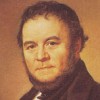When the Foxe preacheth, beware your geese.
George Herbert (1593-1633) Welsh priest, orator, poet.
Jacula Prudentum, or Outlandish Proverbs, Sentences, &c. (compiler), # 337 (1640 ed.)
(Source)
Quotations about:
interests
Note not all quotations have been tagged, so Search may find additional quotes on this topic.
A shrewd man has to arrange his interests in order of importance and deal with them one by one; but often our greed upsets this order and makes us run after so many things at once that through over-anxiety to have the trivial we miss the most important.
[Un habile homme doit régler le rang de ses intérêts et les conduire chacun dans son ordre. Notre avidité le trouble souvent en nous faisant courir à tant de choses à la fois que, pour désirer trop les moins importantes, on manque les plus considérables.]
François VI, duc de La Rochefoucauld (1613-1680) French epigrammatist, memoirist, noble
Réflexions ou sentences et maximes morales [Reflections; or Sentences and Moral Maxims], ¶66 (1665-1678) [tr. Tancock (1959)]
(Source)
Present in the first, 1665 edition in a slightly longer form:Un habile homme doit savoir régler le rang de ses intérêts et les conduire chacun dans son ordre. Notre avidité le trouble souvent en nous faisant courir à tant de choses à la fois que, pour désirer trop les moins importantes, nous ne les faisons pas assez servir à obtenir les plus considérables.
(Source (French)). Alternate translations:In this the prudent man is distinguishable from the imprudent, that he regulates his interests, and directs them to the prosecution of his designs each in their order. Our earnestness does many times raise a disturbance in them, by hurrying us after a hundred things at once. Thence it proceeds, that out of an excessive desire of the less important, we do not what is requisite for the attainment of the most considerable.
[tr. Davies (1669), ¶165]A wise Man should order his Designs, and set all his Interests in their proper places. This Order is often disturbed by a foolish greediness, which, while it puts us upon pursuing several things at once, makes us eager for matters of less consideration; and while we grasp at trifles, we let go things of greater Value.
[tr. Stanhope (1694), ¶67]An able man will arrange his interests, and conduct each in its proper order. Our greediness often hurts us, by making us prosecute so many things at once; by too earnestly desiring the less considerable, we lose the more important.
[pub. Donaldson (1783), ¶205; ed. Lepoittevin-Lacroix (1797), ¶65]An able man will arrange his respective interests;, and conduct each in its proper order. Ambition is often injurious, by tempting us to prosecute too much at once. By earnestly desiring the less considerable, we lose the more important.
[ed. Carville (1835), ¶473]A clever man should regulate his interests, and place them in proper order. Our avidity often deranges them by inducing us to undertake too many things at once; and by grasping at minor objects, we lose our hold of more important ones.
[ed. Gowens (1851), ¶67]A clever man ought to so regulate his interests that each will fall in due order. Our greediness so often troubles us, making us run after so many things at the same time, that while we too eagerly look after the least we miss the greatest.
[tr. Bund/Friswell (1871)]A wise man co-ordinates his interests, and develops them according to their merits. Cupidity defeats its own ends by following so many at once that in our greed for trifles we lose sight of important matters.
[tr. Heard (1917)]A clever man will know how to range his interests, and will pursue each according to its merits. Our greed, however, will often confuse our method; for we run after so many things at once that we frequently miss what is of importance in pursuit of what is negligible.
[tr. FitzGibbon (1957)]Clever men should arrange their desires in the proper order and seek each in turn. In our eagerness we often attempt too many things at once, and by striving too much after the small ones we lose the big.
[tr. Kronenberger (1959)]A wise man ought to arrange his interests in their true order of importance. Our greed often disturbs this order by making us pursue so many things at once that, for too much desiring the least important, we miss those that are most so.
[tr. Whichello (2016)]
They loved their wives, and were beloved by them. Their entire attention was directed to educating their children in the ways of virtue; the miseries of their fellow countrymen were constantly represented to them and held up as the sorriest of examples. Above all, they were taught that individual interest is always bound to the common interest, that to try to separate them was to invite ruin, that virtue is not something costly to achieve nor painful to exercise, and that justice for others is a blessing for ourselves.
They soon had the consolation of virtuous fathers, seeing their children develop in their image.[Ils aimoient leurs femmes, et ils en étoient tendrement chéris. Toute leur attention étoit d’élever leurs enfants à la vertu. Ils leur représentoient sans cesse les malheurs de leurs compatriotes, et leur mettoient devant les yeux cet exemple si touchant ; ils leur faisoient surtout sentir que l’intérêt des particuliers se trouve toujours dans l’intérêt commun ; que vouloir s’en séparer, c’est vouloir se perdre ; que la vertu n’est point une chose qui doive nous coûter ; qu’il ne faut point la regarder comme un exercice pénible ; et que la justice pour autrui est une charité pour nous.
Ils eurent bientôt la consolation des pères vertueux, qui est d’avoir des enfants qui leur ressemblent.]Charles-Lewis de Secondat, Baron de Montesquieu (1689-1755) French political philosopher
Persian Letters [Lettres Persanes], Letter 12, Usbek to Mirza (1721) [tr. Healy (1964)]
(Source)
In the story of the Troglodytes, a tribe who had been decimated by a plague after years of self-interested anarchy where every person did as they wished. The survivors developed a philosophy of mutual aid and community, and prospered.
(Source (French)). Alternate translations:They lov'd their Wives, and were tenderly belov'd by them. They were wholly intent upon educating their Children to Virtue. They continually represented to them the Calamities of their Countrymen, and often set that moving Example before their Eyes. They above all things instill'd into them this Principle, that every private Man's Interest is inseparable from the Interest of the Community. To divide it, is Ruin. That Virtue is not a thing which should be troublesome to us, nor ought the Exercise of it to give us pain; and that Justice to another, is Charity to our selves.
They had soon the Consolation of virtuous Fathers; which is, to have Children like themselves.
[tr. Ozell (1736)]They loved their wives, and were affectionately beloved by them. The training up their children to virtue engaged their utmost care. They continually represented to them the miseries of their countrymen, and placed their melancholy example before their eyes. They especially inculcated upon their minds, that the interests of individuals was always to be found in that of the community, and that to attempt to seek it separately was to destroy it; that virtue is by no means a thing that ought to be burdensome to us, nor the practice of it considered as painful; that doing justice to others is acting charitably to ourselves. They soon enjoyed the consolation of virtuous parents, which consists in having children like themselves.
[tr. Floyd (1762)]They loved their wives, and were beloved most tenderly. Their utmost care was given to the virtuous training of their children. They kept before their young minds the misfortunes of their countrymen, and held them up as a most melancholy example. Above all, they led them to see that the interest of the individual was bound up in that of the community; that to isolate oneself was to court ruin; that the cost of virtue should never be counted, nor the practice of it regarded as troublesome; and that in acting justly by others, we bestow blessings on ourselves.
They soon enjoyed the reward of virtuous parents, which consists in having children like themselves.
[tr. Davidson (1891)]They loved their wives, and were in turn tenderly beloved by them. Their whole ambition was to rear their children virtuously. They constantly placed before their eyes the misfortunes of their fellow-countrymen, and proved to them by this thrilling example that the interest of the individual is one with the interest of the community; that to attempt to separate them is to court ruin; that virtue is a thing the practice of which ought to be found easy; that we should never regard its cultivation as a painful exercise, and that justice to others is a blessing to ourselves. They had soon the consolation of virtuous fathers, which is to see their children grow up in their likeness.
[tr. Betts (1897)]They loved their wives, who cherished them tenderly in return; they devoted their whole attention to raising their children in the path of virtue; they told them repeatedly of the misfortunes of their compatriots, and showed them those piteous examples; above all, they made them feel that the interest of the individual is always identical with the common interest, and that to attempt to separate oneself from it is fatal; that we should not find virtue arduous, or regard it as a painful exercise, and that justice to another is a charity to oneself.
Soon they knew the consolation of virtuous fathers, which is to have children like themselves.
[tr. Mauldon (2008)]They loved their wives, who in turn cherished them. Their great aim was to raise their children in the path of virtue. They constantly told them stories about their compatriots, putting that unhappy example before their eyes. Above all, they stressed that one;s self0--interest is always contained within the common interest, and that to separate those two was to take a step toward ruin; they taught also that virtue need cost us nothing, that we must not regard virtue as a painful burden; finally, they taught that to do justice for one is to do good for all.
In time they enjoyed the consolation of virtuous fathers, which is to have children who resemble them.
[tr. MacKenzie (2014)]
But justice commands us to have mercy upon all men, to consult the interests of the whole human race, to give to every one his due, and injure no sacred, public, or foreign rights, and to forbear touching what does not belong to us.
[Iustitia autem praecipit parcere omnibus, consulere generi hominum, suum cuique reddere, sacra, publica, aliena non tangere.]
Marcus Tullius Cicero (106-43 BC) Roman orator, statesman, philosopher
De Re Publica [On the Republic, On the Commonwealth], Book 3, ch. 15 / sec. 24 (3.24) [Philus] (54-51 BC) [tr. Yonge (1853), ch. 12]
(Source)
Contrasting the dictates of justice, vs the wisdom/prudence of conquest. Earlier sources arrange the fragments to make this ch. 12, as noted. (Source (Latin)). Alternate translations:But justice orders us to spare all, to consult the welfare of mankind, to give to every one his own, and to abstain from every thing that is sacred, every thing that is public, every thing which is not our own.
[tr. Featherstonhaugh (1829), ch. 12]But justice commands us to have mercy upon all men, to consult the interests of the whole human race, to give to every one his due, and injure no sacred, public, or foreign rights, and to forbear touching what does not belong to us.
[tr. Barham (1841), ch. 12]Justice, on the other hand, instructs us to spare all men, to consider the interests of the whole human race, to give everyone his due, and not to touch the sacred or public property, or that which belongs to others.
[tr. Keyes (1928)]Justice, on the other hand, teaches you to spare all men, to consider the interests of the human race, to render to each his own, and not to tamper with that which is sacred, that which is public, and that which belongs to another. [tr. Sabine/Smith (1929)]Justice, on the other hand, teaches us to spare all men, take thought for the interests of mankind, give everyone his due, and not lay hands on the things belonging to the gods, the state, or somebody else.
[tr. Rudd (1998)]Justice instructs us to spare everyone, to look after the interests of the human race, to render to each his own, to keep hands off things that are sacred or public or belong to someone else.
[tr. Zetzel (1999), ch. 24b]But justice instructs [us] to spare everyone, to take care of the human race, to render to each his own, not to touch sacred things, public things, another's things.
[tr. Fott (2014)]
Democracy is two wolves and a lamb voting on what to have for lunch.
Benjamin Franklin (1706-1790) American statesman, scientist, philosopher, aphorist
(Spurious)
Frequently attributed to Franklin, but not found in his writing (and the word "lunch" dates only back to the 1820s). The phrase is only found in sources dating back to the early 1990s, e.g.,
- "Democracy is like two wolves and a lamb deciding on what they want for dinner." [Shelby Foote in Ken Burns, Civil War (1990)]
- "Democracy has been described as four wolves and a lamb voting on what to have for lunch." [Los Angeles Times (25 Nov 1990)]
- "Democracy is not freedom. Democracy is two wolves and a lamb voting on what to eat for lunch. Freedom comes from the recognition of certain rights which may not be taken, not even by a 99% vote." [Marvin Simkin, Los Angeles Times (1992)]
- "Democracy must be something more than two wolves and a sheep voting on what to have for dinner." [James Bovard, Lost Rights, "Conclusion" (1994)]
I’m a pacifist about certain things. I’m a pacifist in the way I define national interest. I use this example frequently: If the Mexicans decided to cross the Texas border with firearms, I would be down there in a moment with a rifle and a whistle to direct the troops to repel them. If the United States is attacked, I will defend it. My problem is the United States’ defending the interests of the Union Oil Company or the United Fruit Company. Those are not American interests. They’re private-money interests, and that bothers me a great deal.
Paul Fussell (1924-2012) American cultural and literary historian, author, academic
“The Initial Shock,” Interview by Sheldon Hackney, Humanities (Nov/Dec 1996)
(Source)
Fairness for everyone would be possible only if everyone’s interests were the same, if everyone were in agreement as to what baseline considerations must be in place for a procedure to be labeled “fair.” But if that were the case, the question of fairness would never be raised. It is raised precisely because everyone’s interests are not the same, and since different interests will generate different notions of fairness (the debate between those who call for equality of access and those who call of equality of opportunity is an example), any regime of fairness will always be unfair in the eyes of those for whom it was not designed.
Stanley Fish (b. 1938) American literary theorist, legal scholar, author
There’s No Such Thing as Free Speech, And It’s A Good Thing, Too, Part 1, ch. 5 (1994)
(Source)
It is often said that governing is the art of compromise. But this is not a statement about governing; it is rather about the values of democracy. Legislating in the common interest means not confusing one’s own values with the common values. It requires giving equal weight to values that one does not share. But too often, commitment to this principle appears weak — a failure to stand by one’s principles.
Jason Stanley (b. 1969) American philosopher, epistemologist, academic
“Democracy and the Demagogue,” New York Times (12 Oct 2015)
(Source)
The conception of men as united to each other, and of all mankind as united to God, by mutual obligations arising from their relation to a common end, which vaguely conceived and imperfectly realized, had been the keystone holding together the social fabric, ceased to be impressed upon men’s minds, when Church and State withdrew from the centre of social life to its circumference. What remained … was private rights and private interests, the materials of a society rather than a society itself.
The shepherd always tries to persuade the sheep that their interests and his own are the same.
The death of democracy is not likely to be an assassination from ambush. It will be a slow extinction from apathy, indifference, and undernourishment.
Robert M. Hutchins (1899-1977) American educator and educational philosopher
Great Books: The Foundation of a Liberal Education (1954)
(Source)












